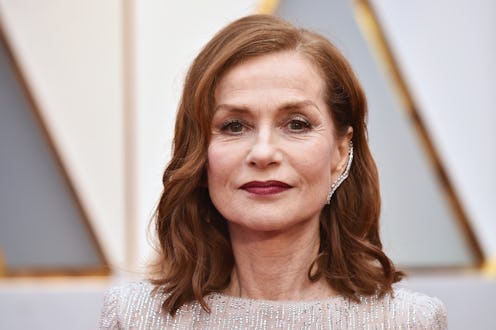Entertainment
Isabelle Huppert Isn't "Concerned" By Hollywood's Treatment Of Women

Anyone who's seen Isabelle Huppert's performance in Elle can attest that it's one of the all-time greats, a piece of work so layered and compelling it's hard to believe it didn't win the star every award under the sun. It's the type of role any female actor would kill to get, made even more appealing considering how few complex roles there tend to be for women over the age of 35 or 40. Yet while the 64-year-old Huppert tells me that she's proud of playing Michele and thrilled that the movie has found success, the conversation about the lack of solid roles for women that's happening these days is not something she feels connected to, despite her work in Elle.
"I’m not particularly happy [the conversation is happening], actually, because I don’t really feel concerned by that," Huppert says, speaking via phone earlier this month. "I guess if people speak too much about it, it means something, to reflect a reality... but it's maybe less than what it seems."
"I’m not saying it does not exist," she continues. But "it might not exist exactly, in the exact conditions and terms that people seem to pretend that it exists."
Huppert has made no secret of her thoughts on this matter, telling The Hollywood Reporter in a November roundtable that she "never felt underemployed because I wasn't 30." Still, her statements might come as a surprise to some, considering the bleak statistics for the amount of screentime given to older women in Hollywood; according to a 2017 study by the Center for the Study of Women in TV and Film, women over 40 made up just 32 percent of all female characters in the previous year's top 100 films.
Yet perhaps Huppert's thoughts are due to a different, more equal environment in France, where she's from and often works. After all, a 2014 study by the European Women's Audiovisual Network found that in France, just 30 percent of women and 37 percent of men surveyed felt that gender inequality exists, a low result as compared the six other European nations studied.
Yet there's plenty of proof that gender inequality is still very much a problem in the continent, despite this survey. In 2015, representatives of European film studios signed a declaration on increasing gender equality in film, calling for improvements to women's access to public film funding, more women in leadership positions within the film industry, and an increase in the recognition of women directors and producers. According to The Hollywood Reporter, the declaration also encouraged European countries to produce statistics on gender equality in film, as there are currently no formal studies done on the subject.
Clearly, many people throughout Europe feel that women are not being treated fairly both on-screen and behind the camera, even if Huppert doesn't share those views. In any case, while her opinion on the matter might be a surprise to some, her honesty about her experience should not be. Huppert has never been one to shy away from saying how she feels about a subject, and that openness is apparent throughout our interview.
"I have nothing to complain about, except I didn’t win," is her (joking) answer to how she feels about the end of awards season; "I'm only interested in working with the greatest people," is what she says when I ask her about how she chooses her roles. She's polite but blunt, happy to speak her mind on every issue, from the reason she took on Elle to what genre she still wishes she could tackle ("a big blockbuster, like a Marvel film," for what it's worth).
Huppert's honesty makes her a perfect fit for Elle, a film with such a disturbing subject matter — a woman gets raped, and tries to find her attacker — that several prominent actors turned down the role before Huppert was chosen for the part. The actor wasn't intimidated by the film's material, although she knew, she says, that it might cause a firestorm.
"You always take the risk not to be understood or misunderstood," she tells me. "But from the moment it was presented in Cannes... we were able to understand that the reactions were very positive and for the majority were beyond any controversy."
And it's true; Elle's plot may be too dark for some viewers' comfort, but due in large part to Huppert's astonishing performance, the movie has found a home with audiences and critics alike. Hopefully, its success will act as a reminder to studios, both American and European, that more characters like Michele should lead movies and have their stories portrayed on-screen.
Eventually, perhaps, Huppert's experience of being a female actor with an array of meaty roles to choose from won't be as unique as it currently, unfortunately is.